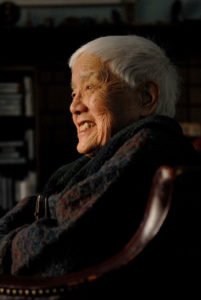
Grace Lee Boggs
*Grace Lee Boggs was born on this date in 1915. She was an Asian American author, radical justice and social activist, philosopher and feminist.
Boggs was born in Providence, Rhode Island, above her father's restaurant. Her Chinese given name was Yu Ping, meaning "Jade Peace." She was the daughter of Chin Lee, originally from Toishan in China and Yin Lan, his second wife, who would become an early feminist role model for Lee. Her father’s first wife was unable to give birth to sons and so he left her for a younger woman. Yin Lan was born into the Ng family who were so poor that her uncle sold Yin into slavery, but she escaped. That same uncle arranged the marriage of Boggs’s parents. Her father migrated to the United States with his second wife, landing in Seattle, Washington, in 1911.
On a scholarship, Lee went on to study at Barnard College, where she was influenced by Kant and Hegel. She graduated in 1935 and in 1940 received her Ph.D. in philosophy from Bryn Mawr College. Facing significant barriers in the academic world in the 1940s, she took a low-paying job at the University of Chicago Philosophy Library. As a result of their activism on tenants' rights, she joined the far-left Workers Party. At this point, she began the path that she would follow for the rest of her life: a focus on struggles in African America.
She met C. L. R. James during a speaking engagement in Chicago and moved to New York. She met many activists and cultural figures such as author Richard Wright and dancer Katherine Dunham. She also translated into English many of the essays in Karl Marx's Economic and Philosophical Manuscripts of 1844 for the first time. She soon joined the Johnson-Forest tendency led by James, Raya Dunayevskaya and Lee. They focused more centrally on marginalized groups such as women, people of color and youth as well as breaking with the notion of the vanguard party. While originally operating as a tendency of the Workers Party, they briefly rejoined the Socialist Workers Party before leaving the Trotskyist left entirely. The Johnson-Forest tendency also characterized the USSR as State Capitalist. She wrote for the Johnson-Forest tendency under the party pseudonym Ria Stone.
She married African American auto worker and political activist James Boggs in 1953 and that same year moved to Detroit, where they continued to focus on Civil Rights and the Black Power Movement. During that time, the Correspondence Publishing Committee was formed and supported by her and her husband. Lee-Boggs unsuccessfully attempted to convince Malcolm X to run for the United States Senate in 1964. Boggs wrote a number of books, including Revolution and Evolution in the Twentieth Century (1974) with her husband and focused on community activism in Detroit where she became a widely known activist. “Women and the Movement to Build a New America” (1977).
In 1992 a year before her husband died, she founded Detroit Summer, a multicultural intergenerational youth program and was the recipient of numerous awards. Additionally, Boggs’ home in Detroit also serves as headquarters for the Boggs Center to Nurture Community Leadership. The Boggs Center was founded in the early 1990s by friends of Grace Lee and James Boggs and continues to be a hub for community-based projects, grassroots organizing, and social activism both locally and nationally. Her autobiography, Living for Change, was published in 1998. In 2005, she continued to write a column for the Michigan Citizen newspaper.
Boggs’ last book was “The Next American Revolution: Sustainable Activism for the Twenty-First Century” (2011, with Scott Kurashige). In it she aligned herself with revolutionaries in the spirit of Thoreau, Gandhi and Dr. King. “We are not subversives,” she wrote. “We are struggling to change this country because we love it.” Her life was the subject of the documentary film American Revolutionary: The Evolution of Grace Lee Boggs (2013), produced and directed by the American filmmaker Grace Lee. Her life was a contemporary example of the intersectionality of Asian and African heritage in America.
In 2014, The Social Justice Hub at The New School's newly opened University Center was named the Baldwin Rivera Boggs Center after activists James Baldwin, Sylvia Rivera, and Grace Lee Boggs. After turning 100 in June 2015, Grace Lee Boggs died on October 5, 2015.
